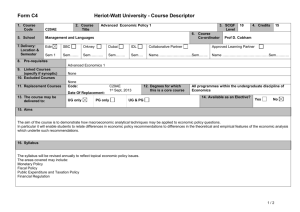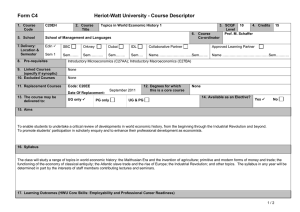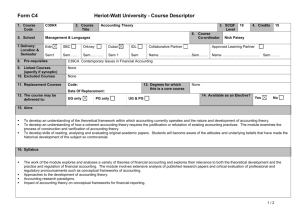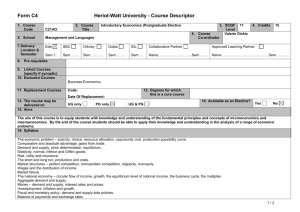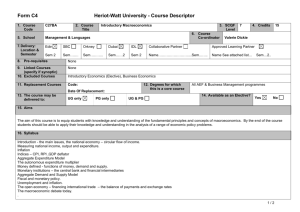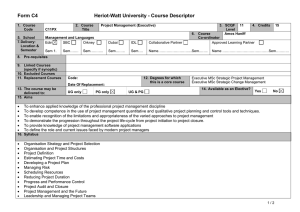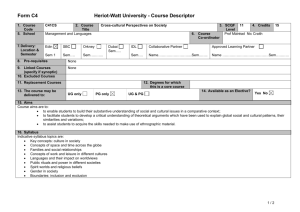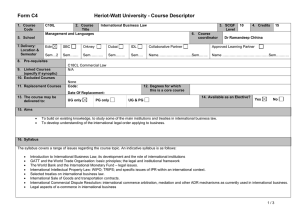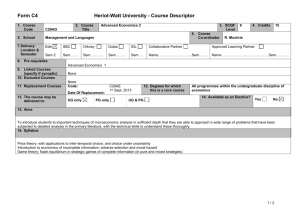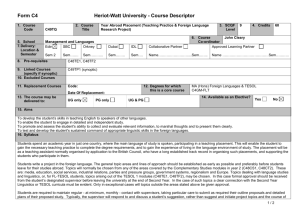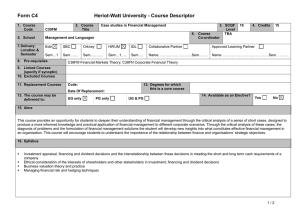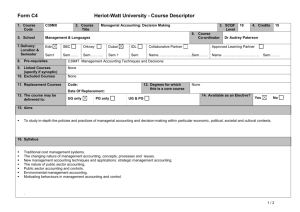C20AF_C4
advertisement
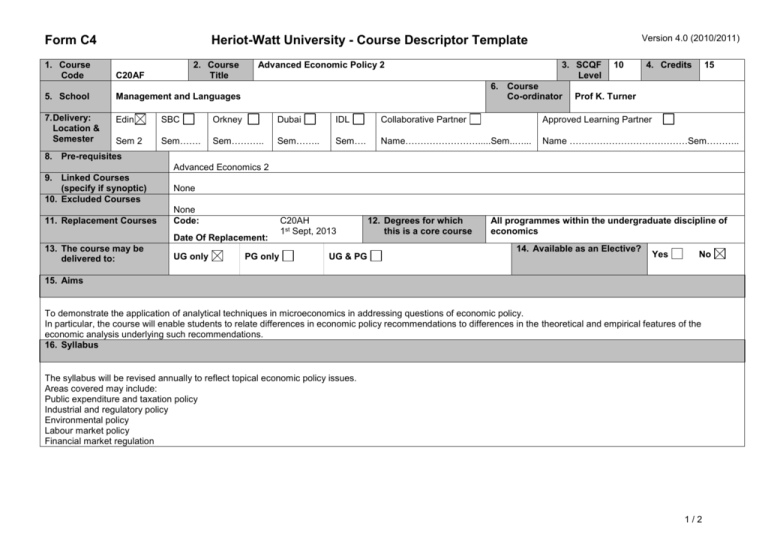
Form C4 Version 4.0 (2010/2011) Heriot-Watt University - Course Descriptor Template 1. Course Code C20AF 2. Course Title Advanced Economic Policy 2 3. SCQF Level 5. School Management and Languages 7. Delivery: Location & Semester Edin SBC Orkney Dubai IDL Collaborative Partner Approved Learning Partner Sem 2 Sem……. Sem……….. Sem…….. Sem…. Name…………………….....Sem..…... Name …………………………………Sem……….. 6. Course Co-ordinator 10 4. Credits 15 Prof K. Turner 8. Pre-requisites Advanced Economics 2 9. Linked Courses (specify if synoptic) 10. Excluded Courses 11. Replacement Courses None None Code: Date Of Replacement: 13. The course may be delivered to: UG only PG only C20AH 1st Sept, 2013 UG & PG 12. Degrees for which this is a core course All programmes within the undergraduate discipline of economics 14. Available as an Elective? Yes No 15. Aims To demonstrate the application of analytical techniques in microeconomics in addressing questions of economic policy. In particular, the course will enable students to relate differences in economic policy recommendations to differences in the theoretical and empirical features of the economic analysis underlying such recommendations. 16. Syllabus The syllabus will be revised annually to reflect topical economic policy issues. Areas covered may include: Public expenditure and taxation policy Industrial and regulatory policy Environmental policy Labour market policy Financial market regulation 1/2 Form C4 Version 4.0 (2010/2011) Heriot-Watt University - Course Descriptor Template 17. Learning Outcomes (HWU Core Skills: Employability and Professional Career Readiness) Subject Mastery Personal Abilities Understanding, Knowledge and Cognitive Skills Scholarship, Enquiry and Research (Research-Informed Learning) On completion of this course, students should be able to: - implement established techniques of scholarly enquiry in analysing economic policy issues - relate differences in economic policy recommendations to differences in the theoretical and empirical features of the economic analysis which underlie such recommendations - discuss how economics as a discipline may contribute to economic policy formulation - demonstrate an understanding of the key economic institutions in the UK economy set within the wider international context Industrial, Commercial & Professional Practice Autonomy, Accountability & Working with Others Communication, Numeracy & ICT The course aims to equip students with the following skills: - the ability to deploy key transferrable concepts in addressing economic problems, including opportunity cost, incentives, equilibrium, the relevance of marginal considerations, the possible gains from voluntary exchange, systems and dynamics. - the ability to work autonomously and collaboratively, drawing on text-based, mathematical, graphical and statistical sources of information to analyse economic problems and to communicate the results of the analysis to specialist and non-specialist audiences - the ability to use a wide range of routine skills (word processing, database manipulation, online literature searches, etc.) in order to interpret and present a variety of data through a variety of means and media as part of professional level practice. 18. Assessment Methods 19. Re-assessment Methods Method Duration of Exam Weighting (%) Synoptic courses? Method (if applicable) Coursework Duration of Exam Diet(s) (if applicable) 100% 20. Date and Version Date of Proposal March, 2013 Date of Approval by School Committee Date of Implementation September, 2013 Version Number 2/2 1
